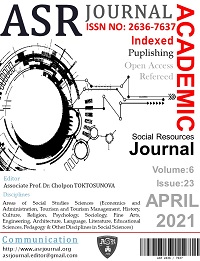Author :
Abstract
William Shakespeare, trajedilerinde ve komedilerinde kadın cinsiyet rollerini farklı açılardan ele almıştır. Trajedilerinde genellikle toplumsal cinsiyet rollerini geleneksel bir bakış açısıyla değerlendirirken, komedilerinde, toplumsal cinsiyet rollerini yıkıcı ve eleştirel yollardan incelemiştir. Bu nedenle, bu makalenin amacı, Shakespeare'in komedilerinin geleneksel cinsiyet klişelerine meydan okurken, trajedilerinin onları nasıl pekiştirme eğiliminde olduğunu göstermektir. Shakespeare’in komedileri, geleneksel cinsiyet rollerini eleştirirken ya da onlarla dalga geçerken, Shakespeare'in trajedilerinde geleneksel cinsiyet klişelerini gün ışığına çıkarma eğilimi vardır. Onları ciddiye almak ya da hafife almak, bir oyunu trajedi ya da komedi yapan ana unsurdur, çünkü bunlar oyundaki olay örgüsünün gelişiminde doğrudan etkilidirler. Othello, Macbeth ve Hamlet'te kadının rolleri, geleneksel zihniyete göre yansıtılır ve belirli çizgilerle keskin bir şekilde tanımlanır. Öte yandan, On İkinci Gece, Size Nasıl Geliyorsa, ve Aşkın Çabası Boşuna’da kadınsı roller gizlenir veya belirsiz hale getirilir.
Keywords
Abstract
William Shakespeare dealt with female gender roles from very different perspectives in his tragedies and comedies. While he generally evaluated gender roles from a traditional point of view in his tragedies, he examined them in subversive and critical ways in his comedies. Thus, the purpose of this essay is to demonstrate how Shakespeare’s comedies challenge traditional gender stereotypes, while his tragedies tend to reinforce them. In Shakespeare’s tragedies, there is a tendency to bring traditional feminine gender stereotypes to light while his comedies criticize or make fun of them. Taking them seriously or lightly is the main element that makes a play a tragedy or a comedy since they are directly influential in the development of plot in the play. In Othello, Macbeth, and Hamlet, the roles of women are reflected in line with the traditional mentality and they are defined in a clear and consistent manner. On the other hand, in Twelfth Night, As You Like It and Love’s Labour’s Lost, feminine roles are concealed or made ambiguous.
Keywords
- Boose, E. (1991). “Scolding Brides and Bridling Scolds: Taming the Woman's Unruly Member”,
- Boose, E. (1991). “Scolding Brides and Bridling Scolds: Taming the Woman's Unruly Member”, Shakespeare Quarterly, OUP.
- Bamber, Linda. (1982). Comic Women, Tragic Men: A Study of Gender and Genre in Shakespeare. Standford: Stanford University Press.
- Callaghan, Dympna (ed.) (2001). A Feminist Companion to Shakespeare, Oxford: Blackwell Publishers. Dusinberre, Juliet, ed. (2006). As You Like It. Arden Shakespeare, third series.
- Dusinberre, Juliet. (1975). Shakespeare and the Nature of Women. London: Macmillan. Fiedler, Leslie. (1973). The Stranger in Shakespeare. New York: Stein and Day.
- Gajowski, Evelyn. (2009). Presentism, gender, and sexuality in Shakespeare. Basingstoke England: Palgrave Macmillan.
- Gourlav, Patricia Southard. (1975). “‘O my most sacred lady’: Female Metaphor in The Winter’s Tale,” English Literary Renaissance 5, no. 3.
- Jardine, Lisa. (1989). Still Harping on Daughters, Women and Drama in the Age of Shakespeare, New York: Columbia University Press.
- Kahn, Coppelia. (1975). “The Taming of the Shrew: Shakespeare’s Mirror of Marriage,” Modern Language Studies 5.
- Mceachern, Claire. (1988). “Fathering Herself: A Source Study of Shakespeare’s Feminism.” Shakespeare Quarterly, vol. 39, no. 3, p. 269. doi:10.2307/2870927.
- Rachkin, Phyllis. (2005). Shakespeare and Women, Oxford University Press. Shakespeare, William. (2012). As You Like It. Collins Classics.
- ____, (1994). Hamlet. Penguin Popular Classics.
- ____, (2017). Love’s Labour’s Lost. Chicago: Chicago Shakespeare Theatre. ____, (1971). Macbeth. Ed. Alfred Harbage. The Pelican Shakespeare.
- ____, (2001). Othello. Ed. Cedric Watts. Wordsworth Editions Limited.
- ____, (1959). Twelfth Night. Ed. Bernard Lott, MA. Longman Group Ltd.
- Smidt, Kristian. (1984). “Shakespeare in Two Minds: Unconformities in Love’s Labour’s Lost.” EnglishStudies, edited by Michael L. LaBlanc, vol. 3, no. 65, pp. 205–219. Literature Resource Center. Accessed Jan. 2017.
- Thamman, Bhavya. (2017). “Love’s Labour’s Lost and Feminism”.





